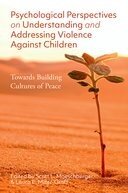Children who are in alternative care facilities experience unacceptable rates of violence prior to entering care, during care, and potentially after they leave care. Prior to a transition into care, children are often exposed to violence in the home through abuse or neglect, or in their community or broader socioecological context.
This chapter in the book, "Psychological Perspectives on Understanding and Addressing Violence Against Children: Towards Building Cultures of Peace", uses a polyvictimization framework to explore how violence impacts children in various types of alternative care from larger scale institutions such as orphanages to family-based care models like foster care. Children face increased risks of violence across this continuum and continue to be vulnerable after they “age out” of the alternative care available for them. Institutional care heightens the risk of trafficking both into and out of orphanages. Policy implications are discussed, including strengthening protective policies, increased research attention to the context and scope of violence against children, and strengthening training and resourcing for caregivers.

